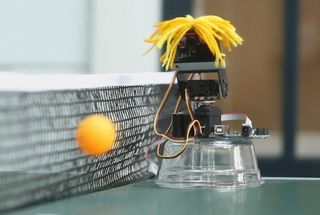Pixy is a small camera about half the size of a business card that can detect objects that you "train" it to detect. Training is accomplished by holding the object in front of Pixy's lens and pressing a button. Pixy then finds objects with similar color signatures using a dedicated dual-core processor that can process images at 50 frames per second. Pixy can report its findings, which include the sizes and locations of all detected objects, through one of several interfaces: UART serial, SPI, I2C, digital or analog I/O. Pixy can detect hundreds of objects from seven different color signatures. As part of a Kickstarter campaign, Pixy is available by contributing $59 or more.
See http://www.kickstarter.com/projects/254449872/pixy-cmucam5-a-fast-easy-to-use-vision-sensor for more information on the Kickstarter campaign, which began on August 15 and ends September 14, 2013.
Pixy is a partnership between Carnegie Mellon University and a small Austin-based company, Charmed Labs. Pixy is the latest version of the CMUcam, a popular line of vision sensors. The goal of Pixy is to provide a smart camera sensor that is easy to use and priced low enough, so that it can be used by a wider audience, including educators and hobbyists that currently use microcontrollers such as the popular Arduino. Pixy can connect directly to the Arduino with a simple cable. Since Pixy has its own processor, it does not bog down the Arduino's CPU with processing images. And since Pixy has several communication options, it can talk to practically any microcontroller, or even simple devices such as relays, servos or lights.
"We tried to make Pixy as easy to use as possible. We think this will make it popular with the robotics and maker communities," Anthony Rowe, CMU faculty member said.
"We've opened up the design by using the Open Source Hardware licensing model. You get source code, schematics, board layouts, everything," said Rich LeGrand, Charmed Labs President. Use of the Open Source Hardware licensing has been growing in the field of DIY robotics. "We expect almost everyone to use Pixy as-is, but we also hope that by opening up the design, others will be able to easily build on Pixy for their application," he added.
Pixy in action-- wig and glasses optional.















Comments